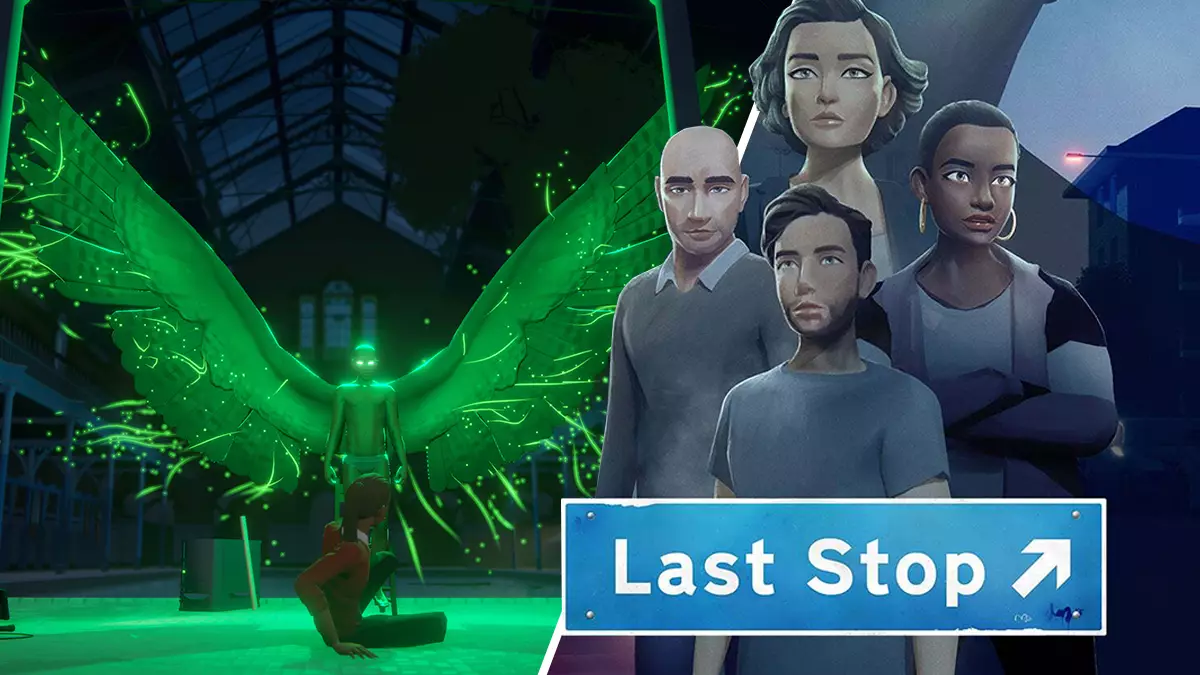
When you think of London-set video games, it's likely a handful of open-world titles come to mind. Grand Theft Auto's London 1969 mission pack, The Getaway and its sequel, 2020's Watch Dogs: Legion. If you're a fantasy lover, perhaps The Order: 1886, ZombiU or Vampyr are in the mix. But for me, as someone who lived in the English capital for a decade, Variable State's new narrative game Last Stop is the most accurately London-feeling game I've ever played. When it's not exploring some sharply written sci-fi drama and fantastical, farcical comedy, that is.
The London of Last Stop isn't one where famous landmarks serve as markers. Instead it's concerned with the suburbs, the residential streets and blocks, the small independent stores and cafés and chip shops, and of course the Underground - notably its outer zones and the tips of its colourful tendrils. The art style of the game isn't aimed at realism, but the shapes and sounds, the mood of each scene that paints in the capital's uncelebrated surroundings as both backdrop and foreground, really brings the city into an unprecedented focus for the interactive medium.
Watch the launch trailer for Last Stop, below
"There was a deliberate effort to avoid the more well-known London landmarks, and show parts of the city that we were more personally interested and connected to," the game's co-director Terry Kenny tells me. "We just picked references we felt were unique and could get personally excited about." Kenny's colleague and second co-director (and score composer) Lyndon Holland continues: "We wanted to focus on getting the more mundane aspects of London right, such as the general architecture of housing stock, the parks, the bus stops, the smaller tube stops outside of zones one and two."
Advert
For the most part, the London of Last Stop isn't rooted in actual locations. It takes cues from several, but beyond a few scenes set in what is clearly a version of Camden's Alexandra Road Estate - "I am a big fan of the brutalist buildings around the city, so I was keen to see some in game," says Kenny of the site-cast concrete housing development built in the 1970s - it's a game less about specifics and more about tone and texture.
"Sometimes it would be an architectural reference, sometimes something spoke to us on a tonal level," says Last Stop's third key creative and co-director, Jonathan Burroughs (all three shared writing responsibilities, too). "Often we were just sentimental for a particular street or neighbourhood. It was always attractive to us to depict the suburbs rather than the city centre. And for the London Underground to be at the centre of the experience."
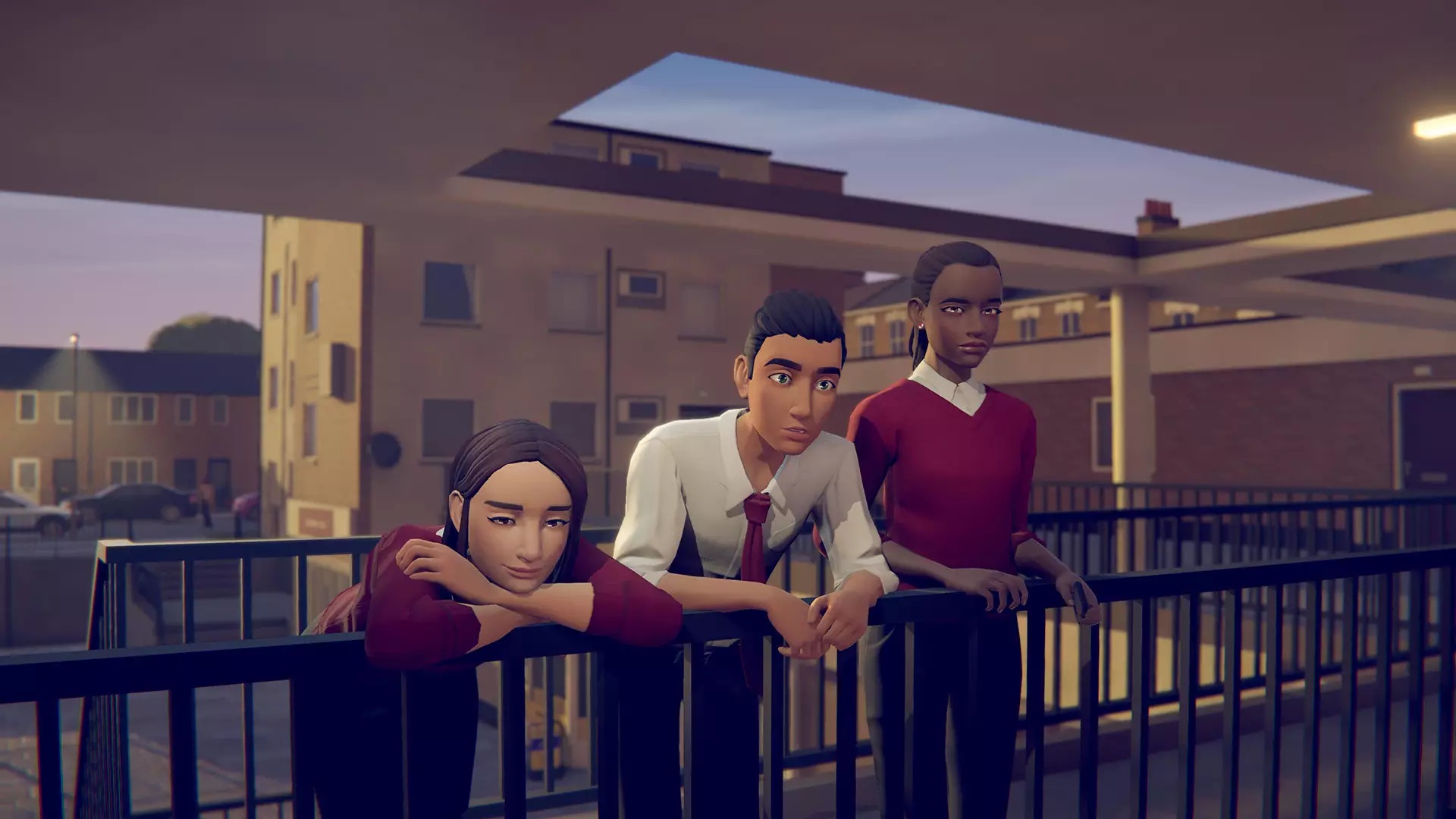
Last Stop is a narrative experience - in keeping with Variable State's award-winning debut title of 2016, the X-Files-y Virginia - where three very different stories, selected from an Underground options screen, play out concurrently only to wrap themselves around each other for a final, out-of-this-world chapter that lifts the action up and away from London... Or, perhaps, it buries it deep beneath the streets and sewers of the city? Anyway, no spoilers for what final fate awaits the player-controlled leads of these three stories: teenage school-bunker Donna; affair-pursuing intelligence agency operative Meena; and John and Jack Smith, two very different men with the same initials who live in apartment blocks opposite from each other.
Advert
It's not just these characters, our protagonists, who are incredibly different from one another - the style of their stories are far from the same, too. Meena's story, 'Domestic Affairs', tells of a woman who has long put her (top-secret, hush-hush) work before her family, and the cracks that have appeared at home have pushed her into the arms of another man - not that it's made her any the happier.
---
"We had initially imagined that all three stories would take on a much darker and serious tone ... but it felt natural to inject some levity and light relief where appropriate, whilst being aware not to compromise the tense, dramatic moments."
- Lyndon Holland
---
Advert
Donna's story, 'Stranger Danger', is a supernatural number of several plot twists where a mysterious man proves to be a supernatural friend... Or are they working to a sinister agenda? Jack and John's largely comedic caper 'Paper Dolls' sees the two men swap bodies, Freaky Friday style, and features a star performance from Lulu Simpson as John's primary school-aged daughter Molly, who is absolutely the heart of this whole game.
Originally there were four separate tales set to make up Last Stop, but having played through the game I do wonder if that'd have been a thread too many, especially when it comes to pulling everything together for the finale. "Tying (the three narratives) and the overarching story together was difficult," says Kenny, "and something that was worked on throughout development." Holland continues: "We had initially imagined that all three stories would take on a much darker and serious tone, but once we started writing the dialogue and playing around with the character moments in scenes, the stories naturally took on the tones that they have now. It felt natural to inject some levity and light relief where appropriate for entertainment value, whilst being aware not to compromise the tense, dramatic moments."
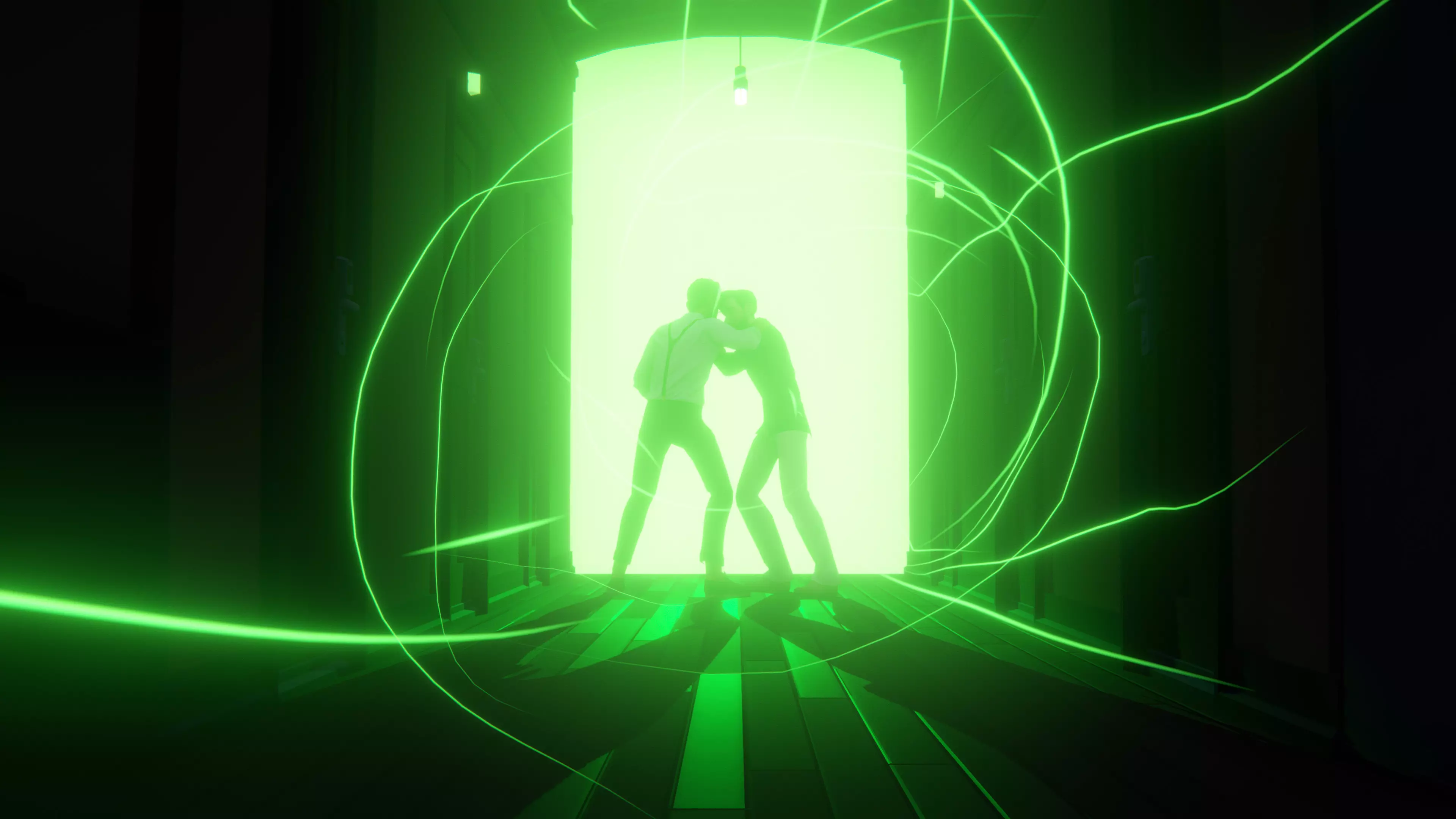
There are laugh-out-loud moments in 'Paper Dolls' - "it was honestly a surprise to us that we were working on something as comedic as 'Paper Dolls' turned out to be," says Burroughs, "but a surprise we embraced and steered towards enthusiastically" - that sit in sharp yet complementary contrast to the suspicion and distrust that courses through 'Domestic Affairs'. The latter is also the last to fully reveal its fantastical slant, keeping the sci-fi purpose of its agency setup under wraps while Donna cheerily chats to a chap with glowing green eyes and John and Jack completely fail to play the part of the other in their workplaces, and both end up getting fired.
Advert
As the player directs each protagonist to their next places on the stage, they make pit-stops at smaller, less-significant activities: brushing teeth, making a cup of tea, straightening a picture frame. It's trivial stuff in the grand scheme of Last Stop's inexorable march towards a completely unexpected climax, but also the kind of grounded, everyday interactions that made me think: these are wholly regular people, encountering exceptional circumstances. They could be you, or me, and that only aids the connection the player will make with them.
"We referred to them as 'characterful interactions', internally," Burroughs explains. "The intention was that the interactions shouldn't feel like arbitrary fuss, but that each one should reveal something of the character involved, deepen our understanding of them, and give us an opportunity to empathise with them. Brushing John's teeth as part of his morning routine gives us a sense of the monotony of his life and how he's stumbling through middle age with a certain complacency. Meena making the tea for her dad is a rare moment of tenderness between a parent and child who for much of the game are pretty antagonistic towards one another."
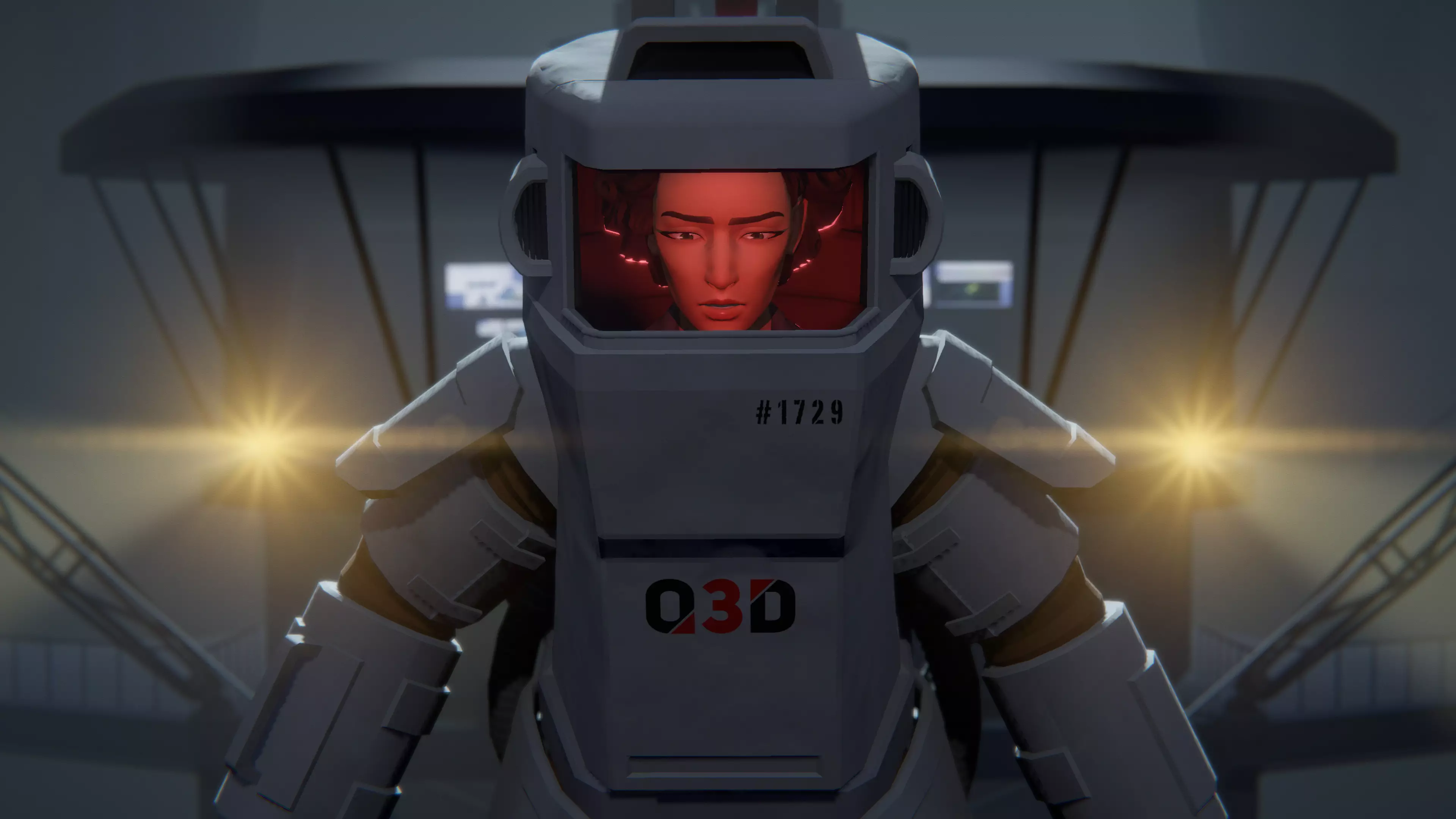
Meena's dad is another supporting character who, like Molly, shines in every scene they're afforded, stealing the limelight somewhat from the avatar we're supposed to be in the shoes of. Not all the NPCs are voiced with quite the success as the aforementioned standouts, as illustrated brilliantly by this hilarious clip of Inel Tomlinson encountering the drug-dealing Spider in 'Domestic Affairs'. But Last Stop's shortcomings are few and far between, more products of budget restrictions than ambition or intent - and what stays with you when the credits roll is a lot more substantial, deeper and more relatable, than some laughs at regional slang delivered with the elegance of a collapsing smokestack.
Advert
But that Last Stop has voice acting at all represents a step onward from the dialogue-free Virginia, which used its Holland-penned score to underpin the emotional heft of the on-screen events. If Virgina was Variable State's arthouse movie project, Last Stop feels more like a BBC-commissioned TV series, in terms of its length, its chaptered progression, its diverse cast and its cues from domestic television hits. Reviewers have commented that it shares some DNA with Doctor Who, and I can see that. The game's makers acknowledge the influence of the small screen - not just in terms of the TV-like camera angles throughout, but also that tone, that feel, that courses throughout the complete collection.
---
"The earliest incarnation of Meena's story emerged from the ambition to make something where the lead is like James Bond... Someone flawed and ruthlessly self-interested, but they're still lionised. It feels like male characters are often permitted to lie and cheat and still be seen as heroic, but it's pretty rare to see a woman in that mode."
- Jonathan Burroughs
---
"We talked a lot about The Twilight Zone and how that show used sci-fi and horror as a way of emphasising some very relatable human stories," Kenny says. "As production went on though, that list of influences only got longer and longer." Holland offers a more contemporary televisual inspiration: "I remember us talking about Killing Eve when writing 'Domestic Affairs', and take your pick for what body swap story may have influenced 'Paper Dolls', but all of these references were quickly forgotten and soon as we started writing the stories in earnest."
On 'Domestic Affairs' specifically, Burroughs offers some further insight: "I think the earliest incarnation of Meena's story emerged from the ambition to make something where the lead is like James Bond or (Breaking Bad's) Walter White, someone who is flawed and behaves in a ruthlessly self-interested and antisocial fashion, but where for all their faults they're still lionised by the audience. And for this person to be a woman. It feels like male characters are often permitted to lie and cheat and still be seen as heroic, but it's pretty rare to see a woman in that mode in a screen drama."
The three discuss names like Edgar Wright and Sam Raimi, Charlie Brooker's Black Mirror, and both Holland and Burroughs zero in on E4's Misfits as a hugely important show in the conceptualising of Last Stop. "It's a show about a bunch of kids who get super powers," says Holland, "but for the most part, it's not about saving the world, it's about them getting through community service in a grotty area of South East London! That mix of something so drab and banal mixed with something so exotic is really appealing to me."
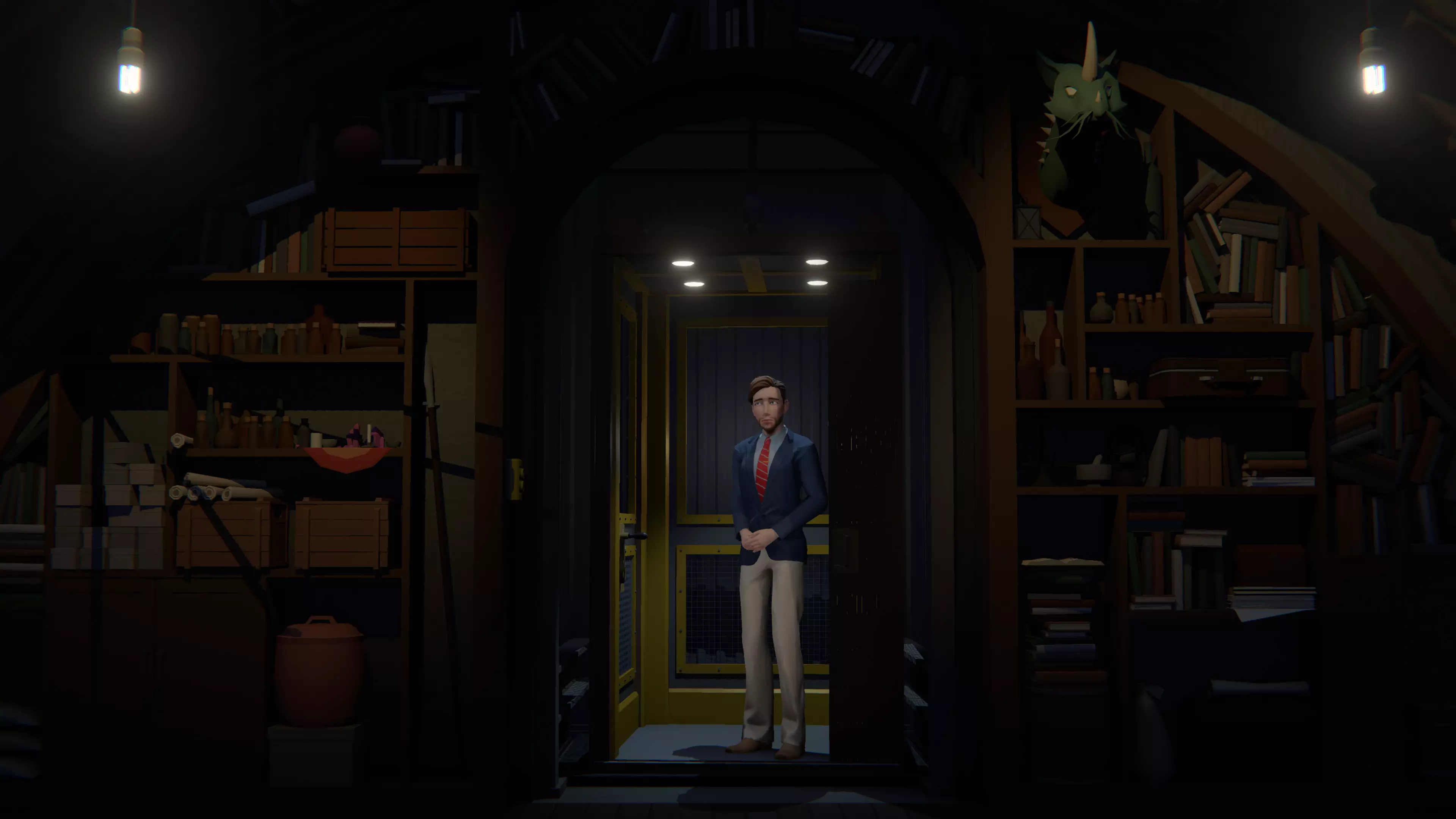
It's not uncommon, of course, for video games to take inspiration from TV and film, but Last Stop does manage to use its influences as foundations for something that feels really original. There are echoes of precedents as the plots proceed, but nothing that ever feels like a direct lift from elsewhere - like Virgina before it, this is an experience that has a strong voice of its own, able to drown out the whispers of what came before. But it's not a game where the player has a fantastic degree of agency. There are some game-changing decisions to be made, but for much of Last Stop's run time, it rather drives itself. And that's something that will always be divisive in this medium.
"I think we expected to get some criticism in certain areas because, like Virginia, Last Stop could be described as a walking simulator due to its focus on story rather than gameplay mechanics," says Holland. "So there are always going to be those who react negatively to that. But I have been enjoying reading the responses to the game on social media, and it seems like there are a lot of people out there who really care about the game and get what we were going for, so I'm really chuffed about that!" Burroughs echoes the sentiment: "I'm really touched by some of the things people are saying about the game. It seems to be finding an audience who really appreciate what we've done and I don't think you can ask for more than that."
London is many things to many people, but in the world of video games it's more often a collection of destinations, of mission-commencement hotspots, than a living, breathing character in and of itself. But alongside Last Stop's compelling cast of ordinary Londoners thrown headlong into wild, wonderful, and ever-so-slightly terrifying circumstances, the city breathes and sighs, sings and cries, like it has only rarely achieved. And it does so with no grandstanding, no set-piece on the side of a postcard-ready tourist attraction. This is the London that Londoners know, and Last Stop is an imaginative and affecting love letter to it.
Last Stop is out now, published by Annapurna Interactive, for PC, Xbox and PlayStation consoles, and Nintendo Switch. Find Variable State online at the studio's official website.
Featured Image Credit: Annapurna Interactive, Variable State
Topics: Xbox, Nintendo Switch, PlayStation, PC, Interview, Indie Games, Annapurna Interactive